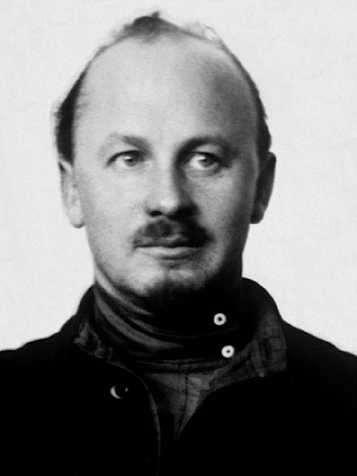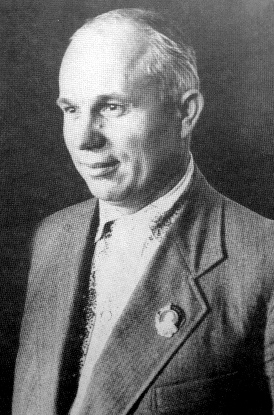|
Andrey Andreyevich Andreyev
Andrey Andreyevich Andreyev (; 30 October 1895 – 5 December 1971) was a Communist Party of the Soviet Union, Soviet Communist politician. An Old Bolshevik who rose to power during the rule of Joseph Stalin, joining the Politburo as a candidate member in 1926 and as a full member in 1932, Andreyev also headed the powerful Central Control Commission of the Communist Party of the Soviet Union from 1930 to 1931, and then again from 1939 until 1952. In 1952, Andreyev was removed from the Politburo and placed in a largely ceremonial position as a member of the Presidium of the Supreme Soviet, Presidium of the Supreme Soviet. Biography Early years Andrey Andreyevich Andreyev was born in the Sychyovsky Uyezd of the Smolensk Governorate of the Russian Empire to a peasant family. He left the village at the age of 13 to work as a dishwasher in Moscow. He attended workers' educational courses, and by the time he was 15 had joined a Marxist circle. He joined the Communist Party of the ... [...More Info...] [...Related Items...] OR: [Wikipedia] [Google] [Baidu] |
Andreyev
Andreyev () is a common Russian surname. It derives from Andrei, the Russian form of "Andrew". The name is also sometimes spelled Andreev, Andreeff, or Andrejew. Its feminine form is Andreyeva (), which is also sometimes spelled Andreeva. Mentions of the surname may refer to: A *Andrejewa de Skilondz, or Adelaide von Skilondz (1880–1969), Russian opera soprano singer and singing teacher * André Andrejew (1887–1967), French-Russian production designer, a classic of the film decor building * Alexander Fedorovich Andreev (1893-1941), Russian inventor of the Jetpack * Alexander Fyodorovich Andreev (1939–2023), Russian physicist *Andrey Andreyev (politician) (1895–1971), Soviet politician, Politburo member under Stalin * Anatole Andrejew (1914–2013), French scientist, biochemist of Russian origin *Adrian Andreev (born 2001), professional Bulgarian tennis player * Andrey Andreev (born 1974), Russian-British entrepreneur B * Boris Andreyev (1915–1982), Soviet film actor, Pe ... [...More Info...] [...Related Items...] OR: [Wikipedia] [Google] [Baidu] |
Soviet Union
The Union of Soviet Socialist Republics. (USSR), commonly known as the Soviet Union, was a List of former transcontinental countries#Since 1700, transcontinental country that spanned much of Eurasia from 1922 until Dissolution of the Soviet Union, it dissolved in 1991. During its existence, it was the list of countries and dependencies by area, largest country by area, extending across Time in Russia, eleven time zones and sharing Geography of the Soviet Union#Borders and neighbors, borders with twelve countries, and the List of countries and dependencies by population, third-most populous country. An overall successor to the Russian Empire, it was nominally organized as a federal union of Republics of the Soviet Union, national republics, the largest and most populous of which was the Russian SFSR. In practice, Government of the Soviet Union, its government and Economy of the Soviet Union, economy were Soviet-type economic planning, highly centralized. As a one-party state go ... [...More Info...] [...Related Items...] OR: [Wikipedia] [Google] [Baidu] |
17th Orgburo Of The All-Union Communist Party (Bolsheviks)
17 (seventeen) is the natural number following 16 and preceding 18. It is a prime number. 17 was described at MIT as "the least random number", according to the Jargon File. This is supposedly because, in a study where respondents were asked to choose a random number from 1 to 20, 17 was the most common choice. This study has been repeated a number of times. Mathematics 17 is a Leyland number and Leyland prime, using 2 & 3 (23 + 32) and using 4 and 5, using 3 & 4 (34 - 43). 17 is a Fermat prime. 17 is one of six lucky numbers of Euler. Since seventeen is a Fermat prime, regular heptadecagons can be constructed with a compass and unmarked ruler. This was proven by Carl Friedrich Gauss and ultimately led him to choose mathematics over philology for his studies. The minimum possible number of givens for a sudoku puzzle with a unique solution is 17. Geometric properties Two-dimensions *There are seventeen crystallographic space groups in two dimensions. These are some ... [...More Info...] [...Related Items...] OR: [Wikipedia] [Google] [Baidu] |
13th Secretariat Of The All-Union Communist Party (Bolsheviks)
The 13th Secretariat of the Communist Party of the Soviet Union was elected by the 1st plenary session of the 13th Central Committee, in the immediate aftermath of the 13th Congress.https://src-h.slav.hokudai.ac.jp/publictn/acta/31/03TakiguchiE.pdf Full members Candidate members References {{Communist Party of the Soviet Union Secretariat of the 13th Congress of the All-Union Communist Party (Bolsheviks) ... [...More Info...] [...Related Items...] OR: [Wikipedia] [Google] [Baidu] |
12th Politburo And The 12th Secretariat Of The Russian Communist Party (Bolsheviks)
The Politburo of the 12th Congress of the Russian Communist Party (Bolsheviks) was in session from 26 April 1923 to 2 June 1924. Composition Members Candidates References Notes {{Communist Party of the Soviet Union Politburo of the 12th Congress of the Russian Communist Party (Bolsheviks) ... [...More Info...] [...Related Items...] OR: [Wikipedia] [Google] [Baidu] |
18th Secretariat Of The All-Union Communist Party (Bolsheviks)
The 18th Secretariat of the Communist Party of the Soviet Union was elected by the 18th Central Committee following the 18th Congress, of the Communist Party, held in March 1939. The Congress took place during a critical period of pre-World War II tensions, with the Soviet leadership consolidating its control under General Secretary Joseph Stalin. Delegates at the Congress discussed economic policies, including the ongoing implementation of five-year plans, and affirmed the party's priorities in the face of growing international uncertainty. The Secretariat, as a key administrative body, played an instrumental role in overseeing the implementation of party directives during this time. List of members References Secretariat of the 18th Congress of the All-Union Communist Party (Bolsheviks) {{Russia-election-stub ... [...More Info...] [...Related Items...] OR: [Wikipedia] [Google] [Baidu] |
17th Politburo And 17th Secretariat Of The All-Union Communist Party (Bolsheviks)
17 (seventeen) is the natural number following 16 and preceding 18. It is a prime number. 17 was described at MIT as "the least random number", according to the Jargon File. This is supposedly because, in a study where respondents were asked to choose a random number from 1 to 20, 17 was the most common choice. This study has been repeated a number of times. Mathematics 17 is a Leyland number and Leyland prime, using 2 & 3 (23 + 32) and using 4 and 5, using 3 & 4 (34 - 43). 17 is a Fermat prime. 17 is one of six lucky numbers of Euler. Since seventeen is a Fermat prime, regular heptadecagons can be constructed with a compass and unmarked ruler. This was proven by Carl Friedrich Gauss and ultimately led him to choose mathematics over philology for his studies. The minimum possible number of givens for a sudoku puzzle with a unique solution is 17. Geometric properties Two-dimensions *There are seventeen crystallographic space groups in two dimensions. These are some ... [...More Info...] [...Related Items...] OR: [Wikipedia] [Google] [Baidu] |
15th Politburo Of The All-Union Communist Party (Bolsheviks)
The Politburo of the 15th Congress of the All-Union Communist Party (Bolsheviks) was in session from 1927 to 1930. Composition Members Candidates References {{Communist Party of the Soviet Union Politburo of the 15th Congress of the All-Union Communist Party (Bolsheviks) ... [...More Info...] [...Related Items...] OR: [Wikipedia] [Google] [Baidu] |
14th Politburo Of The All-Union Communist Party (Bolsheviks)
The Politburo of the 14th Congress of the All-Union Communist Party (Bolsheviks) was in session from 1 January 1926 to 19 December 1927. Composition Members Candidates References Notes {{Communist Party of the Soviet Union Politburo of the 14th Congress of the All-Union Communist Party (Bolsheviks) ... [...More Info...] [...Related Items...] OR: [Wikipedia] [Google] [Baidu] |
18th Politburo Of The All-Union Communist Party (Bolsheviks)
The Politburo of the 18th Congress of the All-Union Communist Party (Bolsheviks) was in session from 1939 to 1952. Composition Members Candidates References {{Communist Party of the Soviet Union Politburo of the 18th Congress of the All-Union Communist Party (Bolsheviks) ... [...More Info...] [...Related Items...] OR: [Wikipedia] [Google] [Baidu] |
17th Politburo Of The All-Union Communist Party (Bolsheviks)
17 (seventeen) is the natural number following 16 and preceding 18. It is a prime number. 17 was described at MIT as "the least random number", according to the Jargon File. This is supposedly because, in a study where respondents were asked to choose a random number from 1 to 20, 17 was the most common choice. This study has been repeated a number of times. Mathematics 17 is a Leyland number and Leyland prime, using 2 & 3 (23 + 32) and using 4 and 5, using 3 & 4 (34 - 43). 17 is a Fermat prime. 17 is one of six lucky numbers of Euler. Since seventeen is a Fermat prime, regular heptadecagons can be constructed with a compass and unmarked ruler. This was proven by Carl Friedrich Gauss and ultimately led him to choose mathematics over philology for his studies. The minimum possible number of givens for a sudoku puzzle with a unique solution is 17. Geometric properties Two-dimensions *There are seventeen crystallographic space groups in two dimensions. These are som ... [...More Info...] [...Related Items...] OR: [Wikipedia] [Google] [Baidu] |
16th Politburo Of The All-Union Communist Party (Bolsheviks)
The Politburo of the 16th Congress of the All-Union Communist Party (Bolsheviks) was in session from 1930 to 1934. Composition Members Candidates References {{Communist Party of the Soviet Union Politburo of the 16th Congress of the All-Union Communist Party (Bolsheviks) ... [...More Info...] [...Related Items...] OR: [Wikipedia] [Google] [Baidu] |





